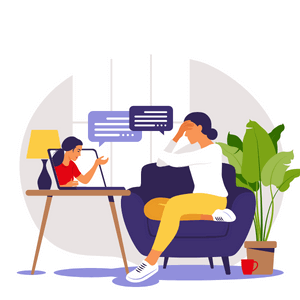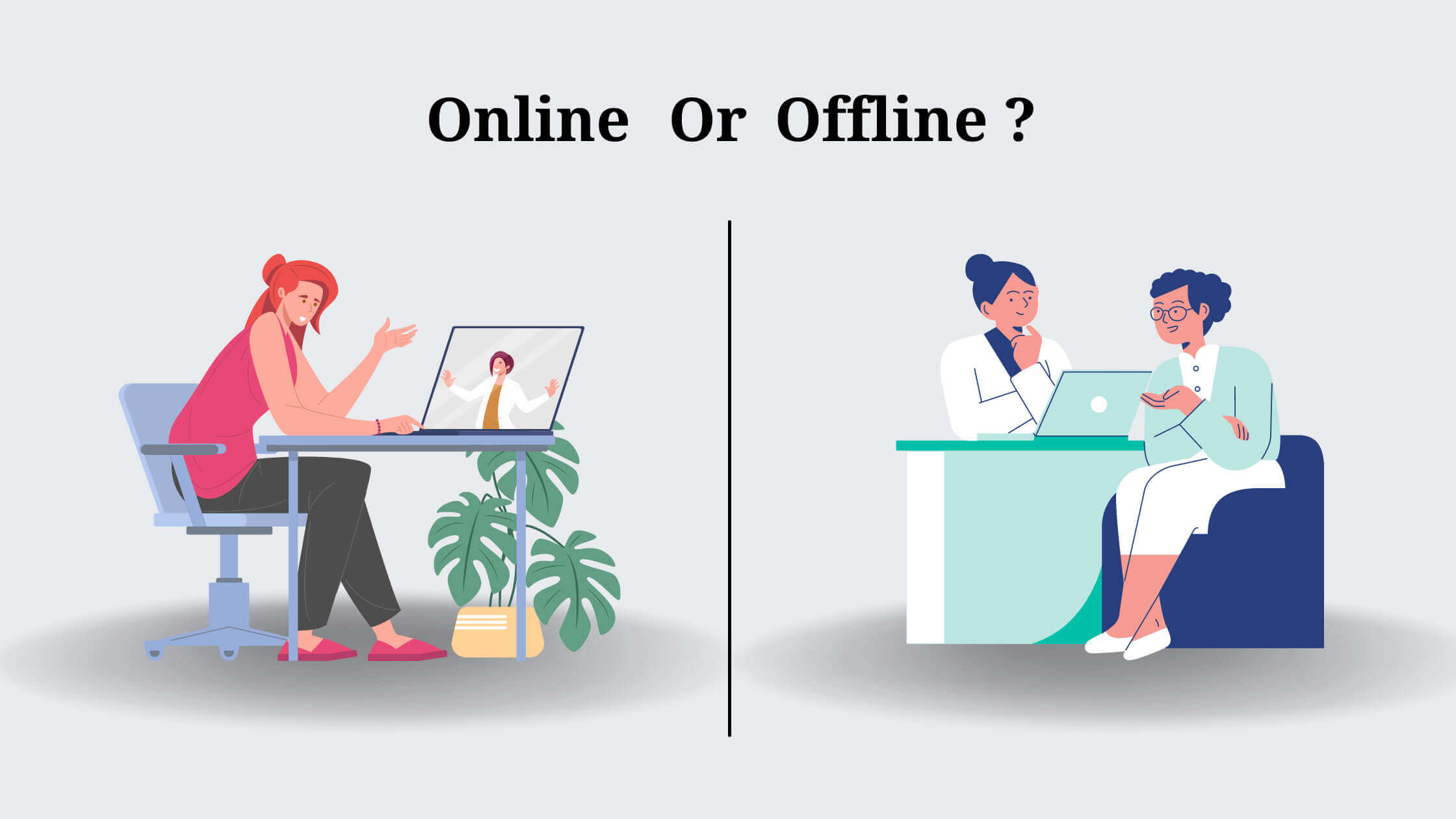One of the most common questions we’ve received over the past few years is whether online training programs can be as effective as traditional offline courses. This question is particularly relevant for our specialized programs, which focus on developing advanced competencies in coaching and therapeutic skills.
In this article, we’ll explore our journey of transitioning from offline to online training, highlight the differences between various modes of learning, and explain why we decided on a hybrid model of prerecorded online and live online courses.
Our Transition Journey: From Offline to Online Courses

When we first considered moving our advanced coaching and psychotherapy certification programs online, I was skeptical. I had concerns about whether techniques involving Hypnosis, NLP, and trauma work could be effectively taught in a virtual environment. The potential for technical issues and the unpredictability of internet connections were significant concerns.
I am sure by now you are wondering whether I am speaking in favor of online training or against them?
Believe me, I had my skepticism.
In fact, a couple of years back, I was in an intense discussion where I vehemently opposed the idea that techniques from Hypnosis and NLP, especially the ones that involve trauma work, should be taught online. I argued that the risks involved were too high, given the unpredictability and instability of internet connections.
Fortunately for me, we have a team at ICHARS that likes challenging each other’s perceptions of what is possible and what isn’t.
So the team started working on a plan to see if they could prove me wrong and help me free myself from this limiting belief I had about what type of training can be provided online.
Piloting Our Online Training Programs: Success Stories

Our journey began with a brainstorming session involving Misba, Mamta, and myself. We discussed how to replicate the effectiveness of our offline training in an online format. This led to the development of our short certification programs in Relationship Counselling and Anxiety Counselling.
We selected techniques that we were confident could be effectively taught and practiced online. With our experience in online client sessions, we piloted these programs with a select group of participants. Their overwhelmingly positive feedback confirmed that our online training met the high standards we set for our offline courses.
To assess the effectiveness of our online training programs, we conducted trial workshops for students who had previously completed our offline training. The feedback was surprising and encouraging. Participants found that online sessions, particularly those involving breakout rooms, offered an intense and effective learning experience. The absence of external distractions allowed for a more focused practice, similar to private sessions in their own practice.
Comparing Online Recorded, Online Live, and Offline Live Workshops
Online Recorded Courses:
- Benefits:
- Flexibility: Access course materials anytime, anywhere.
- Self-Paced Learning: Study at your own pace without time constraints.
- Cost-Effective: Generally cheaper than live courses.
- Challenges:
- Lack of Interaction: No real-time feedback or engagement with instructors and peers.
- Self-Discipline Required: Requires strong motivation and self-discipline to complete.

Online Live Courses:
- Benefits:
- Real-Time Interaction: Engage with instructors and peers in real-time.
- Structured Schedule: Provides a structured learning environment similar to offline workshops.
- Breakout Rooms: Allows for focused practice sessions and group work.
- Global Accessibility: Participate from anywhere, removing geographical barriers.
- Cost Savings: Eliminate travel and accommodation costs.
- Challenges:
- Technical Issues: Internet connectivity can impact the learning experience.
- Time Zones: Scheduling can be challenging for participants in different time zones.
Offline Live Workshops:
- Benefits:
- Face-to-Face Interaction: Immediate feedback and direct engagement with instructors and peers.
- Hands-On Practice: More immersive and tangible practice sessions.
- Networking: Greater opportunities for networking and forming connections.
- Challenges:
- Geographical Limitations: Requires physical presence, limiting accessibility.
- Higher Costs: Includes travel, accommodation, and venue expenses.
Why We Chose a Hybrid Model
Incorporating Offline Live Advantages in Online Live Courses
With advancements in technology and a thoughtful approach to course design, many advantages of offline live workshops can now be incorporated into online live courses, along with added benefits:
- Real-Time Interaction: Online live courses facilitate real-time interaction through video conferencing tools. Participants can ask questions, engage in discussions, and receive immediate feedback from instructors.
- Breakout Rooms: Just like small group activities in offline workshops, online live courses use breakout rooms for focused practice sessions and group work. This ensures an immersive learning experience.
- Structured Schedule: Online live courses provide a structured learning environment with scheduled sessions, similar to offline workshops, ensuring discipline and regular progress.
- Global Accessibility: Unlike offline workshops, online live courses allow participation from anywhere in the world, eliminating geographical barriers.
- Cost Savings: Participants save on travel, accommodation, and venue costs, making online live courses more affordable.
- Recording and Rewatching: Sessions in online live courses can often be recorded, allowing participants to revisit the material for better understanding and retention.
Enhanced Learning Experience Online
Our online courses have been structured to enhance learning effectiveness. Key improvements include:
- Expanded Pre-Course Modules: Additional concepts are covered in pre-course materials, ensuring that live sessions focus on demonstrations and practice.
- Mandatory Pre-Course Completion: Participants must complete these modules before joining the live training.
- Compulsory Attendance: Full participation in live sessions is required to maintain engagement.
- Free Course Repeats: Participants can retake the course at no extra cost, ensuring thorough understanding.
- Increased Post-Workshop Support: Weekly Q&A and case discussion sessions offer ongoing support.
- Money-Back Guarantee: We provide a 100% money-back guarantee, a unique feature in online training programs.
Preparing for Online Courses
To maximize the effectiveness of your online courses, follow these tips:
- Technical Setup: Use a laptop or desktop with a minimum 12-inch screen and a high-speed internet connection. Have a backup option like phone internet if needed.
- Pre-Course Preparation: Complete all mandatory pre-course modules to be fully prepared for live sessions.
- Engagement: Actively participate in live sessions and discussions to enhance your learning experience.
Conclusion: The Future of Online vs Offline Courses
While both online and offline courses have their unique advantages, our experience shows that online training programs can be as effective, if not more so, than traditional methods. With proper design, implementation, and ongoing support, online courses can offer a high-quality learning experience that meets rigorous standards.
If you’re a psychologist, social worker, or medical practitioner interested in advancing your therapeutic skills, explore our Cognitive Hypnotic Psychotherapy Diploma designed specifically for professionals like you.
For life coaches, trainers, and HR professionals seeking to enhance your coaching abilities, check out our Cognitive Hypnotic Coaching Diploma and discover how our advanced training can elevate your practice.
Still have questions? Schedule a free call with our trainers to discuss how our programs can align with your professional goals and career aspirations. Contact us today to get started!

